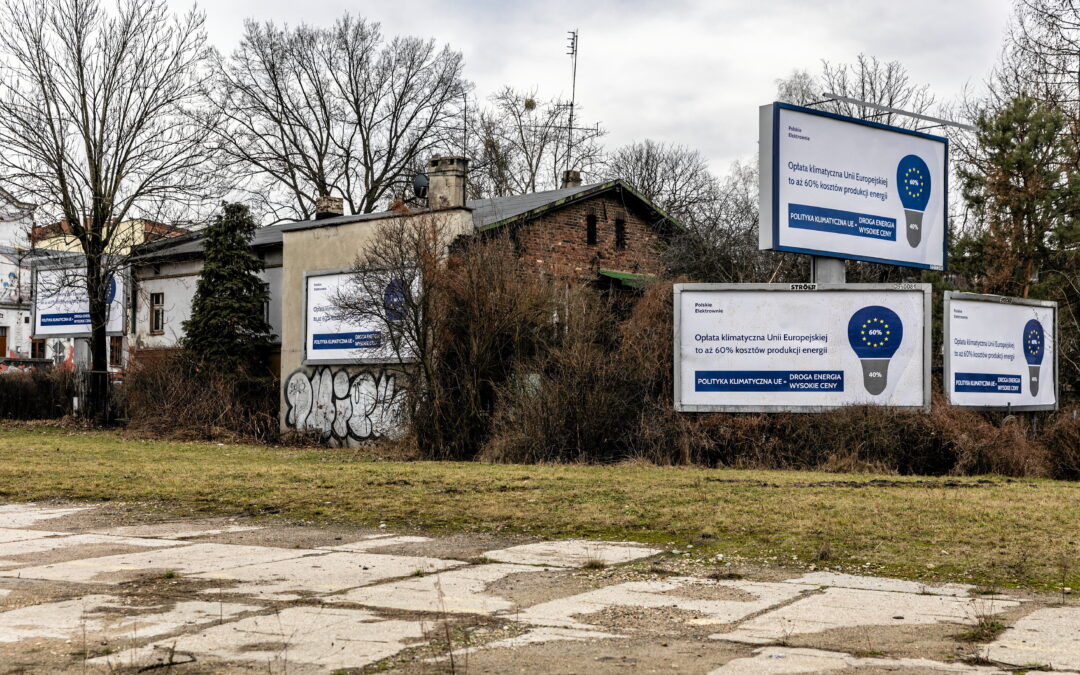By Paweł Wiejski
Polish state energy companies have created one of the largest misinformation campaigns in Poland’s recent history, seeking to blame the EU for soaring electricity costs. Yet, just like with the infamous ”Brexit bus”, countering the distortions only seems to spread them further.
It started with a lightbulb. A simplified, immediately recognisable shape, divided into two parts. The top part is blue, with a figure of 60% surrounded by the EU’s 12 gold stars. The bottom part, representing the other 40%, is grey.
The sign reads: “The European Union’s climate fee is as much as 60% of the costs of producing energy.” To make the point even clearer, the blue box below sets out an equation. “EU climate policy = expensive energy, high prices.”
State-owned power plants have launched a billboard campaign around Poland saying that EU climate charges account for 60% of energy production costs.
"EU climate policy = expensive energy, high prices" pic.twitter.com/Qp6mJBNlSB
— Daniel Tilles (@danieltilles1) February 7, 2022
This simple message is likely to have now been seen by almost everyone in Poland. Billboards with the lightbulb are visible in every Polish town, sometimes several of them next to one another. The ad comes up on news websites, in newspapers and on television. Millions of people received a similar lightbulb along with their electricity bill.
The campaign was formally organised by a consortium of Polish electricity plants, TGPE. But only five of the 12 companies represented in that organisation contributed financially. All of them are state-owned and controlled by people with strong links to the government.
Initially, the companies were unwilling to share details of the financing of the campaign, but investigative reporting by Wirtualna Polska revealed that in total the cost was more than 12 million zloty (€2.6 million), a figure later confirmed by the TGPE.
📍Ponad 12 milionów złotych przeznaczono na antyunijną kampanię dotyczącą cen prądu. Wymyślono ją w Ministerstwie Aktywów Państwowych, a energetyczne firmy państwowe zostały zmuszone do zrzucenia się na realizację pomysłu polityków – ujawnia @SzJadczak.https://t.co/RIHrSqEU57
— Patryk Michalski (@patrykmichalski) February 14, 2022
It also quickly became apparent that the campaign was at least coordinated with the government. Politicians from the ruling coalition have publicly used the figure from the lightbulb to blame the EU for rising electricity prices.
In fact, reporting from Wirtualna Polska as well as Gazeta.pl suggests that the campaign was conceived by the ministry of state assets, which controls the state-owned energy companies. Inside sources indicate that it was high-ranking officials from the ministry who pushed for the anti-EU angle, for example by adding the flag to the lightbulb.
Polska zalana manipulującą kampanią. Stoi za nią Sasin, a prezes PiS dał mu zielone światłohttps://t.co/Uc2bUObZmf
— Gazeta.pl (@gazetapl_news) February 11, 2022
Three levels of manipulation
The campaign has been met with widespread criticism by energy experts, fact-checkers and opposition politicians. Several commentators pointed to similarities with elements of the Vote Leave campaign in the UK ahead of the Brexit referendum in 2016, which also promoted misinformation about the costs of EU membership.
While neither Polish energy companies nor the government are openly advocating for “Polexit” from the EU, their manipulation techniques are strikingly similar to those from the infamous “Brexit bus”. Both campaigns used misleading figures, implied impossible alternatives, and entirely omitted context.
Let’s start with the figures. The Vote Leave bus claimed that the UK had been sending £350 million to the EU every week. This claim has been criticised by the UK Statistics Authority as “a clear misuse of official statistics”. The £350 million figure represents what the UK would have been paying if it were not for the rebate – a discount applied to the UK membership fee.
Likewise, the 60% figure presented on the lightbulb is true only in a very narrow, technical sense. It is the share of EU emission allowances in the cost of producing electricity for the power plants.
This is misleading for consumers, because the cost of electricity production is only a part of what people actually pay in their energy bills. With various taxes, fees and distribution costs, the share of EU emission allowances in the final electricity price falls to 23%, according to calculations by independent think tank Forum Energii.
Uśredniony koszt CO2 to ok. 23% łącznej ceny energii elektrycznej, którą płacą odbiorcy w taryfie G-11.
To nie polityka klimatyczna, a brak transformacji winduje ceny energii w Polsce. Piszemy o tym w nowej opinii @ForumEnergii
▶ https://t.co/saIYmEk4Si pic.twitter.com/6jJQFirX9w— Forum Energii (@ForumEnergii) February 4, 2022
The second level of manipulation concerns the implication of the campaign. The Vote Leave bus declared that the money saved on EU membership could be spent on the National Health Service (NHS) instead.
But, in reality, simply diverting the money spent on contributions to the EU budget elsewhere was not possible, because Brexit brought an end to the EU-funded programmes for innovation, infrastructure and agriculture that had to be replaced by UK’s budget spending.
The implication of the lightbulb campaign is more convoluted. The billboards put the blame for higher energy prices on the EU, but do not offer a course of action. Poland cannot unilaterally reject provisions of the EU climate policy, which is formed through a legislative process between the European Parliament and member states represented in the Council of the EU.
As gas bills rise 54% in Poland, opposition leader @donaldtusk and PM @MorawieckiM have blamed each other.
Tusk said the government is not protecting Poles from growing costs. Morawiecki said Tusk failed to act against the EU's energy and climate policies https://t.co/VzyfBH1xZ8
— Notes from Poland 🇵🇱 (@notesfrompoland) January 3, 2022
The only way for the energy companies to avoid buying emission allowances would be for Poland to leave the EU. However, in such a scenario, energy prices would be a minor problem compared to the economic collapse that move would bring. Moreover, energy prices have also been increasing outside the EU: for example in the UK itself, where household energy bills are set to jump a record 54% in April.
Finally, the third level of manipulation is omitting the context and framing the debate. The biggest success of the Brexit bus was diverting the public debate to a narrow area of budgetary costs and benefits of EU membership. It completely ignored all other areas where the benefits of membership in the EU outweighed the costs, such as participation in the single market, freedom of movement or popular pan-European programmes like Erasmus.
The lightbulb campaign ignores context on multiple levels. The money paid by energy companies for emission allowances is not collected by the European Commission, but by member states. In 2021 alone, the Polish budget gained 25 billion zloty (€5.6 billion) by selling emission allowances.
This money is partly used to finance investments in clean energy; however, environmental NGOs criticise the government for a lack of transparency in that regard. High energy prices also allowed coal power plants in Poland to achieve record profit margins, as discovered by Instrat, a think tank.
💸 Record-breaking energy prices in 🇵🇱? Who to blame – EU climate policy or windfall profits of coal power utilities? Earnings up to EUR 1B in December 2021 alone! 🏭
🔍 Together with @FrankBold_PL we notified energy regulators @UREgovPL and @eu_acer
🧵 1/3 pic.twitter.com/8Ws8borJy6
— Fundacja Instrat (@fundacjainstrat) February 14, 2022
Additionally, the reason why Polish energy companies pay so much for emission allowances is their high CO2 emission levels. Poland has by far the highest share of coal in energy mix of any EU country – around 70% – which is a result of decades of negligence by successive governments, including the current one.
Another aspect completely ignored by the lightbulb campaign is the reason why energy companies have to buy emission allowances in the first place, that is fighting climate change.
The scheme is the main instrument to bring EU’s emissions in line with the mid-century climate neutrality goal, which is necessary for the world to have a shot at preventing the most catastrophic effects of climate change. Focusing the public debate purely on energy costs is beneficial for the energy companies that have largely ignored the climate catastrophe for the past decades.
Will the pushback work?
The Vote Leave bus was powerful because its message was immediately understandable, but any attempt at debunking it required long explanations. Every time someone tried to explain why the statement was either factually incorrect or generally manipulative, it only pushed the message forward. In that sense, the lightbulb campaign has already won – the message has been seen by virtually every person in Poland.
Despite that, dozens of organisations, public figures and media organisations have employed different strategies to fight the lightbulb misinformation.
The debunking prepared by Forum Energii quoted above has been picked up by multiple media organisations. The European Commission answered with a debunking of their own and its vice-president, Frans Timmermans, published an op-ed with Polish news website Onet calling out the misleading campaign message. Opposition politicians announced that they will seek legal recourse against the organisers of the campaign.
To nie Unia podnosi rachunki za energię!https://t.co/Gn63tGGIEZ
— Łukasz Olejnik (@olejnik_lukasz1) February 10, 2022
Some NGOs took more radical steps. Akcja Demokracja organised a crowdfunding campaign to put up billboards with an equally misleading lightbulb, incorrectly claiming that the Law and Justice (PiS) government is responsible for 77% of energy costs.
In an act of subversion, Greenpeace activists modified the largest lightbulb billboard in Warsaw, putting the blame for high energy prices on coal instead of the EU.
Aktywistki i aktywiści klimatyczni postanowili przerobić olbrzymi billboard przy Dworcu Centralnym w Warszawie. Chodzi o owianą złą sławą kampanię koncernów energetycznych.
Więcej: https://t.co/BjwHwMQTuo pic.twitter.com/ZWeZO7gkBG— Greenpeace Polska (@Greenpeace_PL) February 16, 2022
The effects of the lightbulb campaign on public opinion will be difficult to measure, but by using an anti-EU angle on such a large scale the Polish government and energy companies embarked on a dangerous path.
It may not lead to Poland leaving the EU, but it will make conflict with Brussels even worse. It also risks further delaying action on energy transition in Poland, which is already way overdue. No amount of debunking and pushback will make up for that damage.
Main image credit: Grzegorz Celejewski / Agencja Wyborcza.pl





















